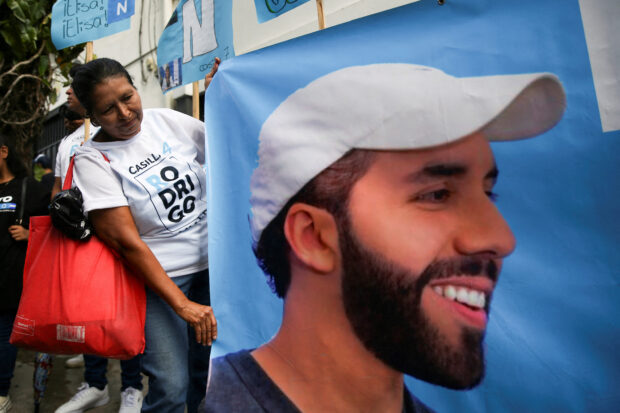
A person holds a poster with a picture of El Salvador?s President Nayib Bukele, during a campaign rally of the Nuevas Ideas party in San Salvador, El Salvador, October 20, 2023. REUTERS FILE PHOTO
SAN SALVADOR — El Salvador’s President Nayib Bukele, who has described himself as the “World’s Coolest Dictator,” has in less than five years transformed El Salvador from a country infamous for its record on murder and gangs to a nation with one of the lowest homicide rates in the Americas.
That record means he is all but certain to be re-elected in a presidential election on Sunday for another five-year term – despite a constitutional bar on immediate re-election, voter worries about the economy, and criticism of his draconian crackdown on civil and human rights.
Under him, more than 2% of the adult population of the Central American country is behind bars and several constitutional rights have been shelved, prompting critics to call him a modern day autocrat.
But Salvadorans weary of years of gang violence can live in ways unimaginable before.
READ: El Salvador leader defends gang crackdown at UN: ‘It was the right thing’
Once barred from going to neighborhoods controlled by rival gangs, residents can now freely move around. They can open businesses without paying crushing extortion fees. They can play with their children or sit with friends outside past sunset.
They may be torn over the erosion of civil liberties, but many say they will still support Bukele.
“Why switch leaders? To go back to the same? We’re happy without the gangs and he needs power to keep making change,” said Elmer Martinez, a 53-year-old construction worker in the capital San Salvador.
Under Bukele, security forces can now arrest anyone without a warrant on evidence as flimsy as an anonymous tip, the government has unfettered access to private communications, and detainees can be held without charge.
Rights groups have denounced the arbitrary arrests of innocent people, torture, and deaths of prisoners in custody.
“They can take anyone at any time and do whatever they want,” said Laura, a teacher who declined to give her last name for fear of reprisal. “This isn’t democracy.”
Still, she said she planned to vote for Bukele, adding that for her there were “no good options.”
A January 2024 opinion poll from the University of Central America’s public opinion institute showed 82% of voters supporting Bukele.
At just 4% in polls, the next closest candidate is Manuel “Chino” Flores for the legacy left-wing Farabundo Marti National Liberation Front (FMLN), which ran the country for 10 years prior to Bukele.
With approval ratings that any sitting president would envy, Bukele has become an inspiration for hardline crackdowns on crime elsewhere in Latin America.
“Bukele proved a ‘zero tolerance’ model suspending rights works – and quickly,” said Amparo Marroquin of the University of Central America. “Now others in Latin America want rapid results in security and the polls, and along with that comes more power in the executive.”
Media machine
Bukele, a 42-year-old former publicist, has alongside the gang crackdown sought to project an image of a transformed, modern nation.
He made El Salvador the world’s first to accept bitcoin as legal tender and is a regular on Instagram and TikTok. Rejecting suits in favor of jeans with tight crew-neck sweaters, he set the tone for his presidency when he opened his address to the U.N. General Assembly in 2019 by taking a selfie posted to Twitter, now known as X.
READ: In world first, bitcoin becomes legal tender in El Salvador
His popularity has been reinforced by a powerful media machine that includes teams of paid internet trolls who flood social networks with government propaganda while whitewashing controversy, manipulating facts, drowning out dissent and targeting journalists and political opponents.
Bukele has warned that a vote for the opposition would mean a return to the past, when El Salvador was known as the “world’s most dangerous country.”
“The opposition will be able to achieve its true and only plan, to free the gang members,” Bukele said in a video weeks before the election.
The front page of government newspaper Diario El Salvador on Jan. 23 read: “War against the gangs could be reversed if the opposition wins more deputies.”
The opposition fiercely denies this. It has warned Bukele is chipping away at El Salvador’s young democracy in a country that fought a civil war from 1979 to 1992 to end one-party rule.
“It’s completely untrue that we want to free gang members,” said Claudia Ortiz, a lawmaker from the emergent Vamos party. “We want to let innocent people out of jail and investigate with due process.”
Seats in Congress will also be up for grabs on Sunday and Bukele’s New Ideas party is predicted to keep its majority.
Recent electoral reforms slashed the size of Congress by nearly a third and consolidated the country’s 262 municipalities into 44 districts.
New Ideas says the move will reduce spending, while civil society organizations like Citizen Action say they will reduce smaller parties’ participation and ultimately tip the scales in Bukele’s favor.
The president has also stacked courts with loyalists who have blocked investigations into an apparent early government pact with the gangs and ministers accused of embezzlement. Their interpretation of the constitution paved the way for him to run for re-election.
In the longer term, Salvadorans say they will need change beyond the security situation. Extreme poverty and hunger rose during Bukele’s time in office and state debt shot up.
Many voters Reuters spoke to noted the skyrocketing costs of food and housing that stretch monthly expenses beyond income.
“Security yes, but everything else is the same – we need improvement in health and education, and most of all, the economy,” said Marcos Rodriguez, a 60-year-old coffee farmer.